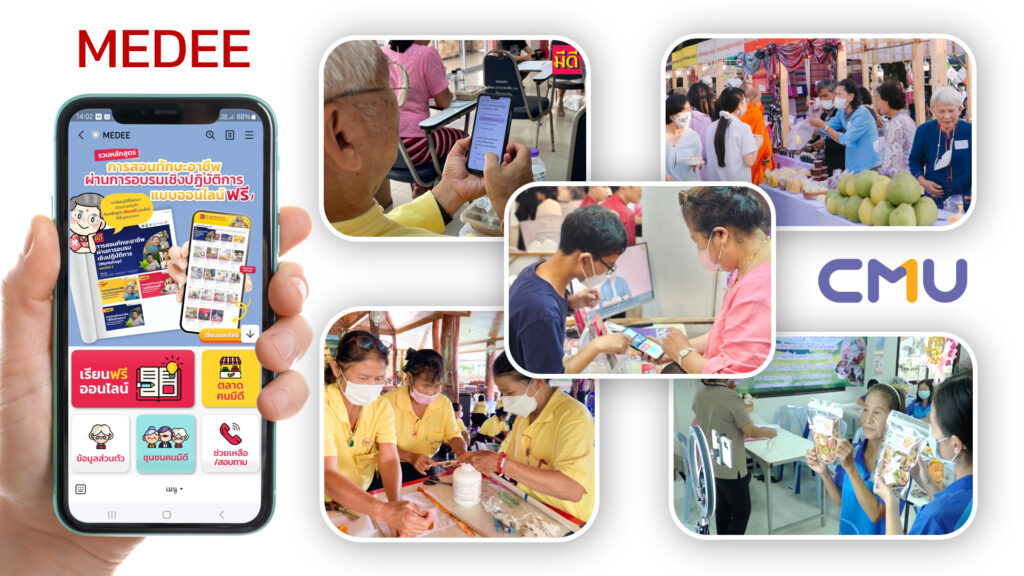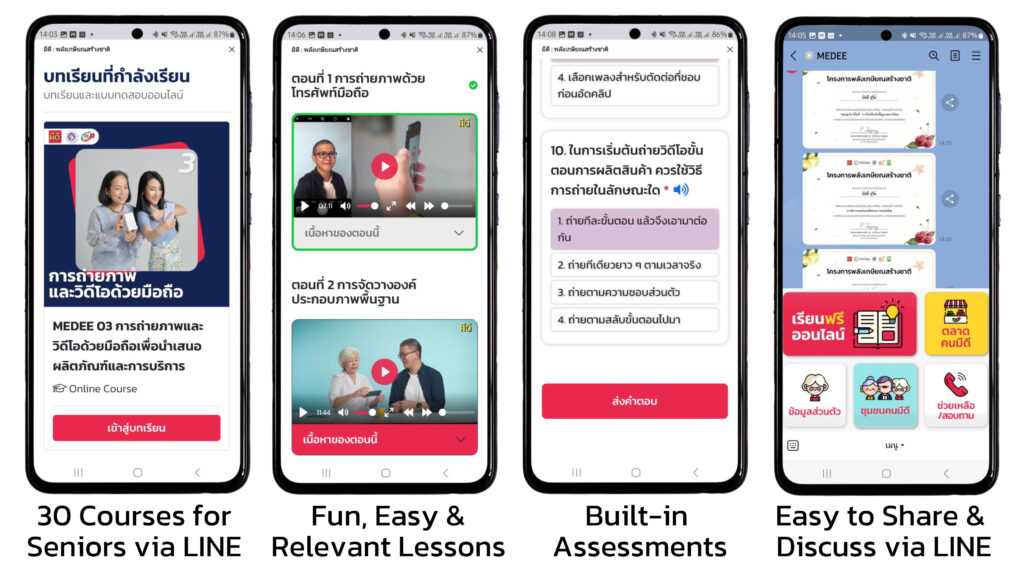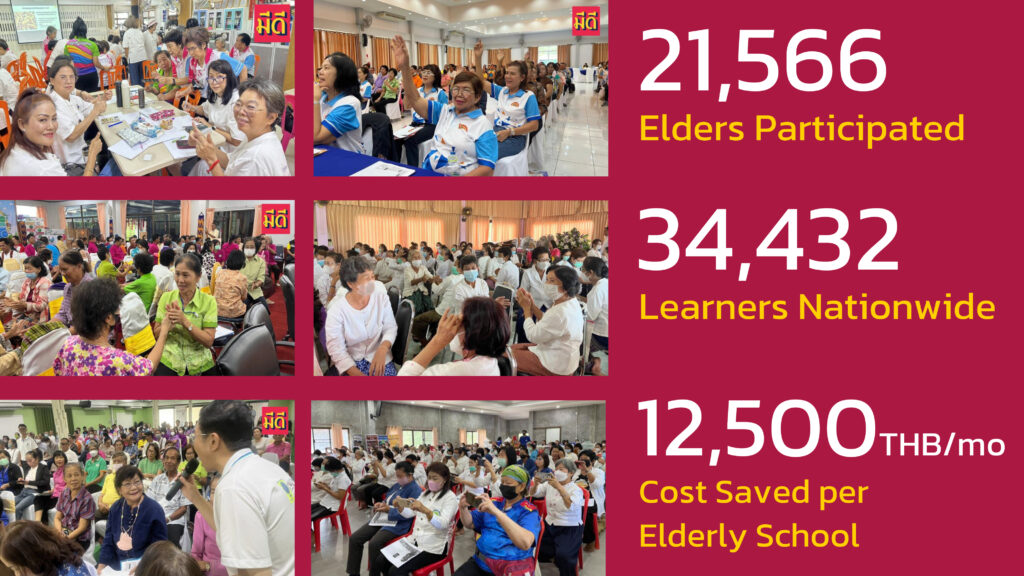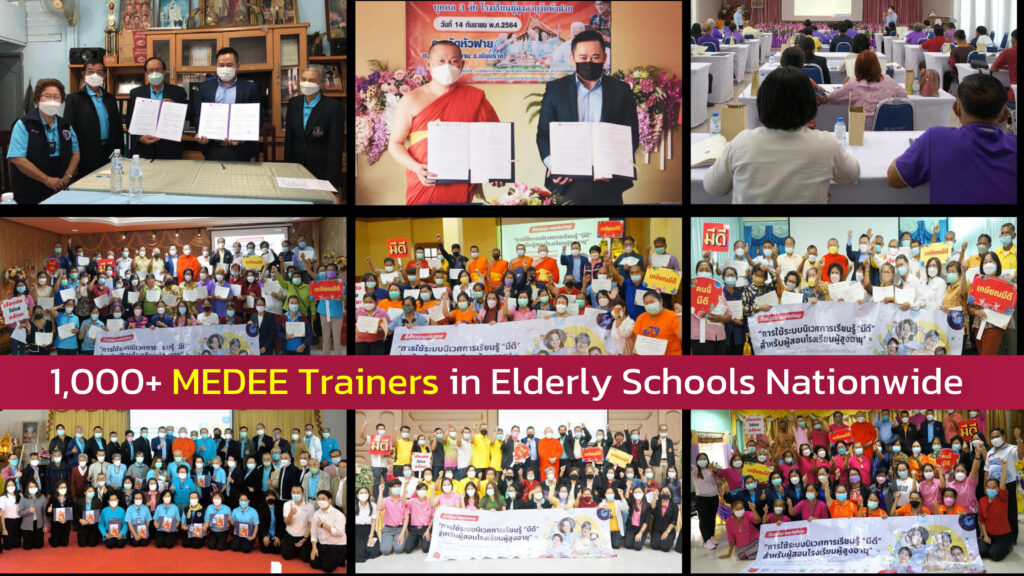2024 HAPI Grand Prize Winner
THE PROBLEM
Thailand is rapidly undergoing a transition from an “aged” to a “super aged” society, with over 20 percent of its population expected to be over the age of 65 by the early 2030s. (See data.) This demographic shift will cause a decrease in Thailand’s working-age population and will mean more people will need to continue working into later life. However, many older Thai people have only participated in the informal work sector or lack the skills and tools needed to create ongoing income in the new digital economy. They may not be familiar with e-learning tools that would allow them to upskill and continue generating income after retirement.
THE INNOVATION
In response to this challenge, in 2021, Chiang Mai University’s School of Lifelong Education launched the Multi-Generation Entrepreneur Development Education Ecosystem or “MEDEE.” MEDEE uses a Line-based online learning tool, combined with in-person teaching through a robust network of community organizations, to provide lifelong learning opportunities for older people. MEDEE offers over 30 courses that aim to teach older people digital literacy skills, as well as occupational skills, to help them set up an online business and generate income. It also features courses on financial management and physical and mental health so that people can be self-reliant and fulfilled as they age.
Unlike similar Massive Online Open Courses (MOOCs), MEDEE courses are offered through Line, a free instant messaging and social media app popular in Thailand and other countries in the region, because this is a platform that older Thai people are most familiar with and know how to use. Furthermore, they have partnered with a network of over 2,500 elderly schools throughout the country and over 70 government, private-sector, and community-based agencies to help provide in-person training sessions and workshops to inform older people about the availability of MEDEE, how to access it, and to supplement what they are learning.
MEDEE’s approach focused on working with a broad range of stakeholders and offering multiple educational styles, including self-study through the Line app, blended learning at an elderly school, and community workshops. This has allowed them to successfully attract a large number of users. Since its launch in 2021, over 34,000 people have participated in their system, of whom about 21,000 are older people.
In particular, elderly schools have found that the MEDEE platform provides online learning resources, including lessons via LINE, reducing the need for costly on-site instruction. This blended learning model (online and occasional on-site sessions) allows these institutions to offer a wider range of courses and reach more students, overcoming logistical and financial barriers to provide comprehensive education for older adults. By using this blended approach, it is estimated that the elderly schools also save over 12,500 Thai baht a month (just under US$400/month).
As part of their goal to provide older people with the skills to pursue income-generating activities, MEDEE also operates and provides support for users who want to participate in online and in-person marketplaces. Participants are encouraged to access MEDEE’s online marketplace, where they can practice the skills acquired from courses such as “Using Facebook and Online Marketplaces” and “Understanding Digital Marketing.” They can also test new product ideas at in-person marketplaces, where they can collaborate and learn from each other.
This emphasis on practical skills aims to empower older people and improve their sense of self-worth and ability to rely on themselves. Chiang Mai University has carried out research assessing the economic impact of the project, which found that the social return on investment is 11.88, meaning for every 1 Thai Baht invested in the project, the economic and social benefits amount to 11.88 Thai Baht in return, demonstrating the strong positive outcomes of the innovation.
In addition, they leverage Line’s social networking and messaging functions to help connect both older and younger users. Students can use Line to quickly send chat messages to each other or to experts who can provide advice. They can download course completion certificates or share links with interesting information with their networks more broadly, helping to foster social connectedness and intergenerational interaction. MEDEE has found that older people who participate in the project tend to be happier as a result.
MEDEE has also emphasized including older people themselves as key stakeholders at all levels of their work. For example, in addition to their network of senior schools, they have established a group of over 1,000 “MEDEE Certified Trainers”—many of whom are seniors—who are equipped to teach people how to access the system. Older people have also been involved in suggesting course topics. For example, some users requested a course on Nordic walking, and others on avoiding financial fraud, and these have both been added to the curriculum.
Moving forward, Chiang Mai University has put thought into ensuring the sustainability of the project. They aim to transition the project to a social enterprise model based on the strong partnerships they have already developed with communities and organizations throughout Thailand.
KEYS TO SUCCESS
- A strong emphasis on building a broad network of key stakeholders, including elderly schools and other organizations, allowed MEDEE to quickly attract a large number of users for their courses and ensured the sustainability of the innovation.
- MEDEE focuses on practical courses that will equip older people with concrete skills to help them participate in the digital economy and generate income, improving their self-reliance.
- Utilizing Line, an app that many Thai people are familiar with, as the basis for the educational programs means MEDEE is easy to access for people who might not be as tech-savvy. It also meant they did not need to start from scratch to develop a platform for sharing lessons.
- The voices of older people are incorporated throughout the project, including in course design and working as MEDEE-certified trainers to teach others how to access the ecosystem.
FINANCIAL STRUCTURE
MEDEE’s course offerings are provided free of charge to participants. The project itself is funded by grants made by the National Research Council of Thailand and Chiang Mai University. The initial budget for developing the learning innovations and online lessons was about 3.6 million Thai Baht (a little over US$100,000) for the first year, which laid the foundation for the program. As they transition to a social enterprise model, the goal is to have much of MEDEE’s funding covered by corporate social responsibility funds, as well through more advanced marketing and product development resources, which they will charge for.
LINKS





